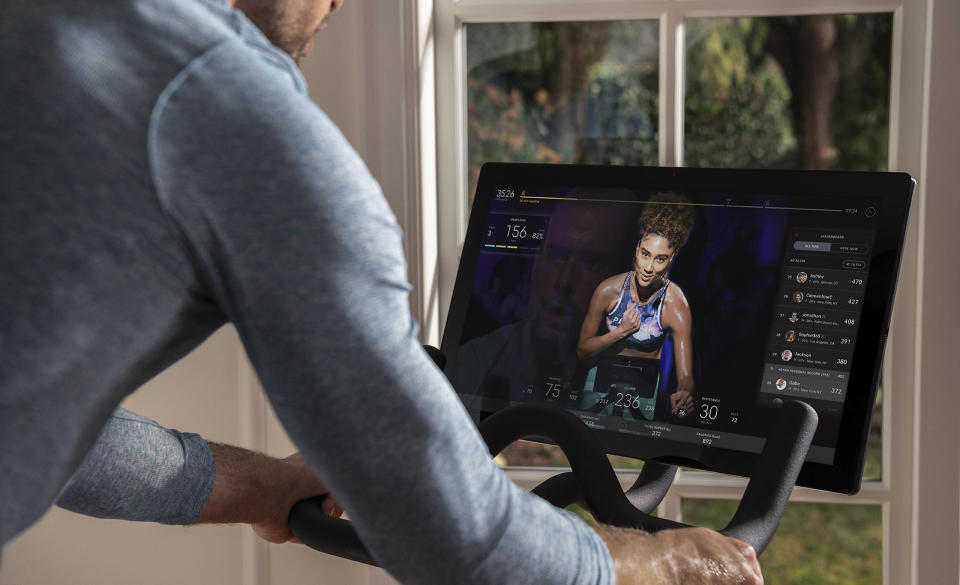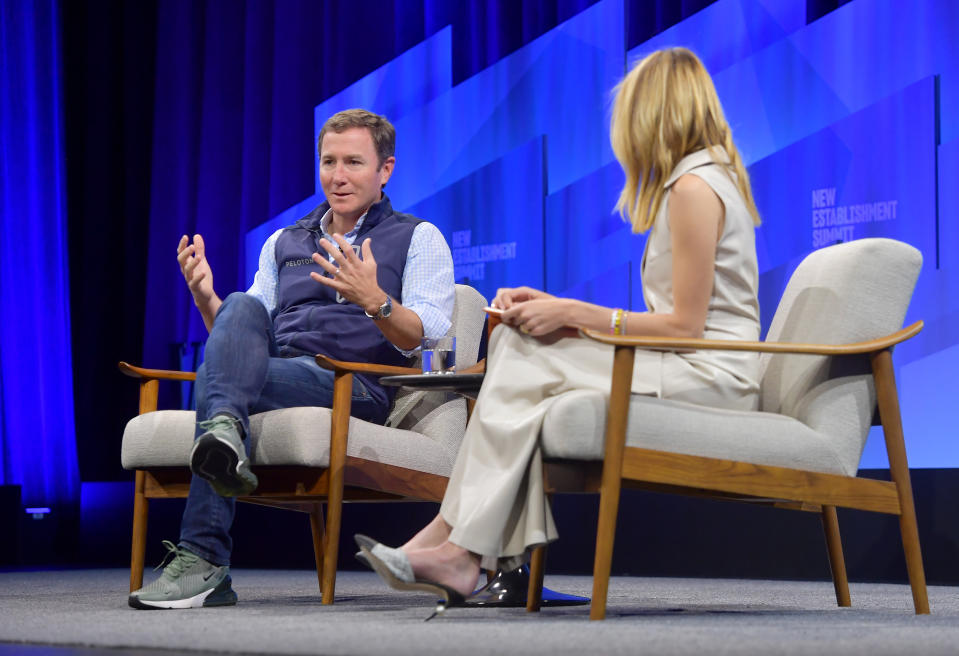Peloton CEO likens riders to 'pilgrimage coming to mecca'

Home Rider Invasion sounds like an intense alarm feature or a new video game.
But it’s actually what a passionate group of Peloton-ers call their self-organized annual gatherings. During an event also known as “homecoming,” spin fanatics descend upon New York City every May to spend hours cycling in the Chelsea studio and frolicing around Manhattan.
“They will come to take a class and they will meet their instructor. And they will take a class in real life in the studio, do a selfie with their instructor. But they also want to meet each other,” Peloton founder and CEO John Foley at the Vanity Fair New Establishment Summit this week.
Last year, the Physician Moms group congregated in New York City, went to dinner at Eleven Madison Park (where prices range from $175 to $335 per person — before alcohol), saw a Broadway show (“Hamilton,” he thinks), spent four hours at the Peloton studio, and talked about their lives over coffee, Foley said.
From yachts to private jets
It makes sense that this particular homecoming isn’t for the masses — it’s for the elite. Bikes retail for $2,300, treadmills cost $4,300, and memberships without any hardware go for $39 per month.

In fact, Peloton (PTON) bikes have become a status symbol among the upper echelons of the world. Though Foley wouldn’t say whether Michelle Obama has a Peloton (we know she’s an avid spinner), he did confirm Hugh Jackman, Jared Kushner, and Ivanka Trump are big Peloton people. And he “[thinks] they do” have aliases on the platform.
Under Armour founder Kevin Plank, who recently announced that he will be stepping down as the company’s CEO, is also a big fan of Peloton. Foley shared that Plank sent him a picture of his wife on a yacht in Croatia a few years ago.
“We’ve seen them on private jets, but I don’t want to fuel this narrative that it’s for rich people.”
“I will say in a wild way, if you are a named celebrity, if you’re a recognized face in Hollywood or business... going to the gym is a different experience for you. You didn’t put on your makeup, don’t look great, don’t like your outfit, you don't want the paparazzi coming after you. Disproportionately, people who are named human beings want a Peloton bike because they can work out, they want those endorphins, they want to feel good, they want to look good, and they can do it in the privacy and the comfort of their own home without having to deal with the world. So it is a very long list of people that are named people,” Foley said.
‘Pilgrimage to a mecca of sorts’
Given the high-profile aficionados in Peloton’s corner, it’s no surprise that even the annual New York gatherings would attract wealthy individuals, even if they’re not “named people.” As Emily Jane Fox of Vanity Fair pointed out during the interview, Peloton’s “religion is very expensive to join.”
“It’s a little bit of a pilgrimage to a mecca of sorts that’s really special and really fun. So you’re riding on the Peloton platform at home and you’re by yourself and it’s convenient and you do it when you want it. But then you engage with this community, and come to New York City and it’s an...atypical thing that’s part of our business. It’s a very powerful part of our business,” he said.
While Foley is self-aware enough to call out Eleven Madison Park and “Hamilton” extravaganza as a “bad example,” it feels facetious when he says he hopes to democratize access to the high-end bike.
With a new $50 million facility coming to New York in 2020, Foley expects the gatherings to only expand in size.
“This is going to be make me seem incompetent but this community largely happens on its own. We are shepherds of it in some sorts, and we give them the tools and social features, high fives and video chat, and we host this homecoming event. It is a beautiful thing that is self-organized. HRI came out of the community. We didn’t create HRI, they started pilgrimaging to New York City on their own and we said, ‘Wow, we’ve got a tiger by the tail.’”
The business of Peloton’s high-end fitness equipment has been under increased scrutiny, with shares closing lower by 11% during its first day of trading. Calling the IPO a “head scratcher,” Foley claims “investors will be handsomely rewarded, and doubters will learn” over the long-run.
“There’s a lot of anxiety in the financial markets around recession, losses over growth. That narrative is interesting to me as a CEO. When we set out on our IPO journey, growth was great, but when we priced three weeks later, it was all about profitability. We were caught up in the WeWork conversation. We’re a different model and company. We’ve been painted with a brush of irresponsible leadership, bad corporate governance, no path to profitability — that have nothing to do with Peloton,” he said.
Follow Yahoo Finance on Twitter, Facebook, Instagram, Flipboard, SmartNews, LinkedIn, YouTube, and reddit.
Melody Hahm is a senior correspondent at Yahoo Finance, covering entrepreneurship, technology and culture. Follow her on Twitter @melodyhahm.
Read more: